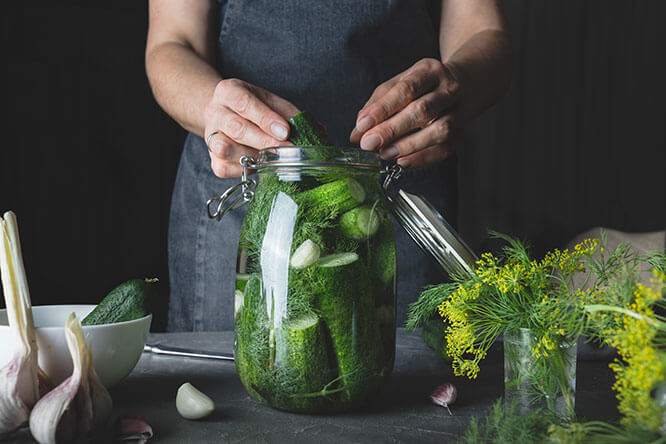Often branded as a ‘fad’ or a ‘trend’, fermentation is one of the oldest food practices we know of! Nutritionist Lucy Davies guides us through the benefits of including fermented foods in your diet.
In so many areas of life, it seems that as humans, we’re being pulled back to basics; nature, simplicity, authenticity, things that work with nature and with our bodies too!
Why? Maybe because science is now able to validate ,for the western mind, so much that ancient wisdom has always known. Maybe because we just feel in our bones that adopting a more natural approach is a good thing. I don’t know, but there’s certainly nothing new about fermented foods!
As I’m writing this now, my husband’s just passed me a bowl of one of my all time favourite meals; rice, salad, a big dollop of kimchi and a perfectly cooked poached egg. I’m instantly transported to the East by the pungent smells and flavours of ginger, chilli and garlic in the kimchi, on top of that it means I’m eating raw vegetables that are high in vitamins, minerals, enzymes and antioxidants, which have been taken to a whole new level by the simple act of mixing them with a bit of salt and leaving them to ferment for a fortnight.
To promote good gut health, we need an amount of good bacteria inside our gut in order for it to function efficiently.
I even love witnessing the whole process of fermentation too. I am a self-confessed fermentation geek – it genuinely excites me to come back to a sourdough starter an hour after feeding it, to see that it’s doubled in volume and bursting with yeast and bacteria. These things are alive – and living foods are exactly what we need to aid in our digestion and maintain gut health.
So, what is fermentation and how does it change the food?
There are so many benefits to fermented foods; the feeling of preserving your own ingredients whilst amplifying their goodness, all without the need to add anything artificial, is a blessing in itself but added to that there’s probiotic good bacteria which appear by some kind of (very scientific) magic during the process.
To promote good gut health, we need an amount of good bacteria inside our gut in order for it to function efficiently. We also now know that much of our immune and nervous systems are governed by our gut health – so it really is worth looking after. Whilst foods such as sauerkraut and its Korean equivalent kimchi, plus kombucha, kefir etc are great for adding nutrients, enzymes and probiotics to our diet, the benefits of the cooked fermented foods such as sourdough bread or fermented oats are a bit different.
The process of fermenting grains allows the grains to be partially broken down before digestion begins. The process also reduces the gluten content, meaning much less strain on the body. It also reduces the GI content meaning a more stable energy source, plus it’s much less acid forming than white processed bread.
The role of phytic acid
The skin/husk of grains, nuts, seeds and beans – contain phytic acid. Its purpose is to protect the plant, but when we eat these foods without preparing them correctly – presumably as nature intended, it binds to minerals (mainly iron, magnesium, calcium and zinc), stopping us from absorbing these minerals.
Luckily for us, calcium shortage is often easily detected, but magnesium and zinc influence so many processes in the body, meaning deficiencies can be a lot trickier to spot.
The process of fermenting grains allows the grains to be partially broken down before digestion begins.
The good news is that fermentation is one of the keys to neutralising phytic acid. Sourdough does it naturally, and if you like to make overnight oats, add a small dollop of a rye sourdough starter to it – phytic acid gone by morning.
Benefits of Prebiotics
Of course, not everything must be fermented; nature has once again come up trumps with prebiotics – mainly found in vegetables such as garlic, onion, cabbage, artichoke, and legumes such as chickpeas and lentils, these fibre rich foods actually feed the probiotics in our guts, helping them to multiply and maintain a healthy balance overall.
So, if you’re looking to introduce fermented foods into your diet – your gut with most certainly thank you for it!
Lucy Davies is a Naturopathic Nutritionist and a member of our Thrive Experts panel. She is busy writing for food & health magazines, recipe developing, catering, and also offers consultancy work.










